| Winter Heat
Two Quebec films, Alain Desrocher`s Nitro and Patrick Huard`s Les Trois P’Tits Cochons, ranked among 2007`s ten biggest moneymakers. Yes, Quebeckers continue to watch home grown movies along with the latest Harry Potter and Spider-Man concoctions, but The Three L’il Pigs and Nitro were not massive hits, nor were they creative breakthroughs. As the New Year kicks in, the film industry hankers after a movie like Jean-Marc Vallé’s C.R.A.Z.Y., which combined bold aesthetics with box-office profitability.
The first contender is Lyne Charlebois’ Borderline, a compelling, visually alive film likely to be an audience favourite, and maybe a critical darling. For one thing, Borderline exudes raunchy, voluptuous sex from its opening salvo of female nudity and a waning, post-coital erection. If I’m right, the film will be a comeback for producer Roger Frappier, whose last big hit was 2003`s La Grand Seduction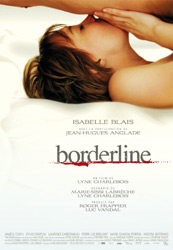 (Seducing Dr. Lewis). The industry is rooting for the groundbreaking producer, whose credits include Decline of the American Empire and Jesus of Montreal. He has fought and won a battle with a grave disease. (Seducing Dr. Lewis). The industry is rooting for the groundbreaking producer, whose credits include Decline of the American Empire and Jesus of Montreal. He has fought and won a battle with a grave disease.
Like C.R.A.Z.Y., or Jean-Claude Lauzon`s Léolo, Charlebois’ debut feature rides a young person`s emotional rollercoaster. This time, however, the grappling with familial madness, sexual confusion, and problems with burgeoning creativity are seen from a female point-of-view.
Borderline was adapted from two quasi-autobiographical novels by Marie-Sissi Labrèche: Borderline and La Brèche (The Breach). An ambitious movie, it crosscuts between three different periods in Kiki, the main character’s life. She`s a child with a clinically insane mother, a 20-year-old party girl careening toward a sex and booze meltdown, and a 30-year-old budding writer trying to exorcise her destructive past.
Driven by Isabelle Blais‘ riveting performance as grownup Kiki, Borderline features French star Jean-Hugues Anglade, unforgettable in 37.2 le matin (Betty Blue) and La Femme Nikita, as a married university professor who both arouses and frustrates the story`s licentious anti-heroine. At a press conference during last year`s shoot, Anglade said that Borderline was the hottest picture he`s made since Betty Blue. And Betty Blue, with its languid opening dolly toward Anglade and Béatrice Dalle making love in summery twilight, ranks as one of the most torrid movies ever made.
Charlebois, an episodic TV, commercials, and music video director, knows how to raise the temperature of an image. One of the few recent Quebec movies set mainly during a Montreal winter, Borderline gives gives the dreaded season colour and magic. Click here to see a trailer for Borderline.
Bienvenue au Rendez-Vous
Also generating warmth at the peak of winter, Les Rendez-Vous du Cinéma Québécois (February 14-24) operates as a cozy confab screening premieres of new movies, many of the past year’s releases, and classics that programmers believe should be re-visited. Moreover, the Rendez-Vous runs 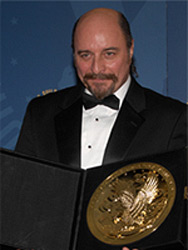 special events like this year`s professional workshops on screenwriting with Denys Arcand and directing with L.A. based Yves Simoneau, pictured at right. special events like this year`s professional workshops on screenwriting with Denys Arcand and directing with L.A. based Yves Simoneau, pictured at right.
Simoneau`s Bury My Heart at Wounded Knee, an HBO production which, as reported by Northernstars, recently took a Directors’ Guild of America Award, will have its Quebec debut during the RVCQ. The event also organizes movie-related exhibitions and numerous parties.
And for the first time in its 26-year history, the Rendez-Vous’ slate of films (299 this year) has been organized into 16 series with tags like “Vues d’auteurs,” “Box-office,” and “Identité.” The grouping “A Taste of the Rendez-Vous” aims at attracting Anglos viewers to an event that in bygone days was reluctant to show English-Language work.
S & M
A guaranteed audience-pleaser at the RVCQ, Montrealer Howard Goldberg`s S&M: Short and Male plays as a comic doc that is information-packed and has serious points to make. Men who are shorter than average height endure job discrimination, daily humiliations, and above all, rejection by women genetically programmed to crave guys who tower over them.
Goldberg appears throughout his feature-length movie as a “faint presence,” he told me during an interview, “exploring the issues through other people`s eyes.” The short and male characters include a brash L.A. entertainment lawyer, a pissed-off ex-cop, and twin Montreal dentists who complain that they suffer from double the trouble. Cranking up the humour, Goldberg`s “repertoire of baffled and non-plussed looks” appear in a string of reactions to the outlandish stuff he hears. These shots are beautifully timed, Woody Allen-esque moments. the trouble. Cranking up the humour, Goldberg`s “repertoire of baffled and non-plussed looks” appear in a string of reactions to the outlandish stuff he hears. These shots are beautifully timed, Woody Allen-esque moments.
Produced by Goldberg’s wife, Ina Fichman, Short and Male filmed in Canada, the U.S., France, and China. The doc raises issues like the dangerous use of growth hormones, the magic of elevator shoes, and at the movie`s climax, agonizingly painful “stature lengthening operations”that trade off unbelievable misery for a few extra inches. These surgeries are widespread in China where surprisingly, job applications want to know how tall you are.
Goldberg, himself a short male (5′ 3-1⁄2”) who endured the indignity of teenage girls dating tall numbskulls rather than him, decided to make the film after “a conversation about being short with another short guy my age. What struck me was how much we both had to say to each other with such enthusiasm. I didn’t remember ever having a conversation like that before in my life.”
Even today, Goldberg feels his height. At a “formal film event like an awards ceremony, it’s very difficult. You just feel like you’re disappearing into a hole.” Prejudice against “shrimps” is so deeply ingrained, the production company “approached about a dozen short male actors,” but as soon as their handlers “found out the subject of the film, they hung up.” Only Henry (The Fonz) Winkler wanted to appear, but couldn’t work the movie into his schedule.
CTV will air a condensed version of Short and Male on May 24.
On Screen
Still in theatres as I write, Denys Arcand’s L’âge des ténèbres has stalled at just over $1 million in box-office returns. Meanwhile, The Last Continent, Jean Lemire`s documentary portrayal of his hazardous, 430 day Antarctic expedition to study climate change picked up an extraordinary $1 million in about 5 weeks. The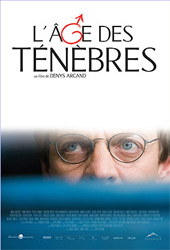 English-language version of the Lemire`s epic opens across Canada in the spring. English-language version of the Lemire`s epic opens across Canada in the spring.
Apart from its disappointing box-office, L’âge des ténèbres failed to get a best foreign film Oscar nomination even though for a few weeks in January, the movie was on a short list. Appearing on Quebec`s public TV network Télé-Quebec, Arcand once again defended his movie and tried to explain audience indifference to it. Unlike 2003`s Les Invasions barbares, which won the foreign film Academy Award, L’âge des ténèbres lacks conventional dramatic hooks, and Arcand keeps insisting, a conventional three act structure.
As the turbulent story of the picture continued to unfold, a restored version of Seul ou avec d’autres, Arcand`s first shot at moviemaking, a student film he co-directed with Stéphane Venne et Denis Héroux, had a special presentation at the Cinémathèque québécoise. Seul ou avec d’autres was the first Arcand film to get viciously attacked by at least one Québécois critic, a tradition that has continued to this day.
Bye Bye Black Sheep?
Independent producers here are biting their nails over the fate of TV network, Télévision Quatre Saisons, the self-proclaimed black sheep of general interest, over-the-air broadcasting. Largely because of the specialty channels’ mushrooming success and subsequent loss of advertising revenue, TQS fell into such a deep 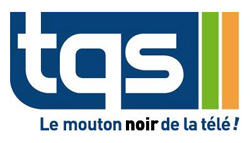 financial hole, it sought bankruptcy protection. If the black sheep ends up in the slaughter house, hungry producers lose a major buyer for their wares. financial hole, it sought bankruptcy protection. If the black sheep ends up in the slaughter house, hungry producers lose a major buyer for their wares.
Owned by cable company Cogeco (60%) and CTVglobemedia (40%), TQS is being scrutinized by several buyers, reportedly including Rogers Communications and Quebec-based Radio Nord. While the network’s audience share, now dropping, lags behind top broadcaster TVA, it usually draws about the same 12% to 15% as Radio-Canada, the CBC’s French-language service. Naturally, TQS management is furious that Radio-Canada and the specialties have an unfair advantage; RC is subsidized by taxpayers, specialties benefit from subscriber fees. TQS wants to charge fees and can’t understand why the CRTC won’t let it.
Except for a couple of shows like Loft Story, the Quebec version of France’s take on Big Brother, TQS rarely wins time slots. The network runs locally-produced entertainment programming and horrendously dubbed U.S. shows. In the early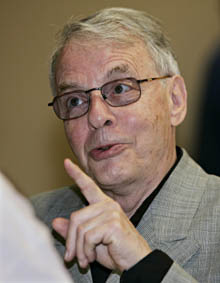 days, the nipple licking and discretely hidden BJs on Bleu Nuit, its late night softcore program, seemed boldly avant-garde. days, the nipple licking and discretely hidden BJs on Bleu Nuit, its late night softcore program, seemed boldly avant-garde.
Like the producers, some of Quebec`s politicians worry that the loss of TQS would be a catastrophe for indigenous culture. Critic Gaëtan Charlebois disagrees. In a Montreal Gazette piece he wrote, “TQS was a big baying rabid hound of a network with its libido in overdrive and an unabashed taste for crassness which, say the bosses, never made money despite desperately appealing to the lowest common denominator in every aspect of its existence. … TQS is no more an integral part of the cultural landscape than Dollarama.”
Founded in 1986 as a fresh new player on the TV scene, TQS chose writer and former Radio Canada chair Guy Fournier to be its first program director. Something of a black sheep himself, Fournier resigned from the CBC in September 2006 after writing that it was legal for Lebanese men to have sex with animals as long as the animals aren’t male, and then publicly confessing in an interview that at age 75, he preferred defecating to sex.
Hello Alliance!
As industry players worried about the future of Télévision Quatre Saisons, they were happy to learn that Quebec`s investment agency, the Societé General de Financement du Quebec, decided to channel $100 million into Alliance Films, the strongest film distributor in Canada. The SGF will control 51% of voting shares, and the company`s head office will return to Montreal, where film industry masterminds Victor Loewy and Robert Lantos created the operation during the 1970`s. Alliance`s highly successful Quebec division, Vivafilm, will stay on course, captained by its top execs Guy Gagnon and Patrick Roy. |

![]()

![]()